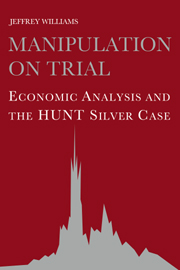Book contents
- Frontmatter
- Contents
- List of figures
- List of tables
- Preface
- Foreword by Thomas O. Gorman
- 1 Why the Hunt silver case?
- 2 Turmoil in the silver market
- 3 Identifying a manipulation
- 4 Testing for the cause of the price rise in silver
- 5 Determining the appropriate price of silver
- 6 Inferring manipulative intent
- 7 The predicament of economic analysis in the courtroom
- Glossary of commodity market terms
- References
- Index
4 - Testing for the cause of the price rise in silver
Published online by Cambridge University Press: 17 September 2009
- Frontmatter
- Contents
- List of figures
- List of tables
- Preface
- Foreword by Thomas O. Gorman
- 1 Why the Hunt silver case?
- 2 Turmoil in the silver market
- 3 Identifying a manipulation
- 4 Testing for the cause of the price rise in silver
- 5 Determining the appropriate price of silver
- 6 Inferring manipulative intent
- 7 The predicament of economic analysis in the courtroom
- Glossary of commodity market terms
- References
- Index
Summary
At its most basic level, the Hunt case concerned the assigning of a cause to the unprecedented rise in the price of silver between May 1979 and January 1980. The Hunts trading received the attention it did, not because of the unusual spreads between delivery dates and the uncharacteristic coin/bullion differential, but because of the extraordinary course of the spot price. As the jury was instructed by Judge Lasker, the plaintiff had to prove that the defendants played a substantial part in causing the price rise. Ultimately, the plaintiff came close to identifying the Hunts' alleged manipulation as the impact on the price itself.
In most legal disputes a central event must be explained. Even in previous manipulation cases, there was a central event, which took the form of a suspicious price rise over the last days or hours of a particular futures contract. The alleged manipulator's behavior could be described as a single action: usually a long position established days or weeks earlier and held unchanged through the price rise. Also, the alleged manipulator was the principal actor: usually, few other longs remained in the expiring contract and no new longs entered. Under such circumstances, the question to be resolved is whether the alleged manipulator's action proved sufficient to have caused the price rise (and whether that action was illegal).
The Hunt case, in contrast, dealt with multiple actions causing many events over many months.
Information
- Type
- Chapter
- Information
- Manipulation on TrialEconomic Analysis and the Hunt Silver Case, pp. 100 - 134Publisher: Cambridge University PressPrint publication year: 1995
